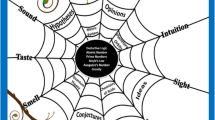Abstract
Tom Spengler found himself lying in his hospital bed with lots of time to think, reflect, read and learn. The brush with death and the evident lack of people beyond his family who came to visit him deeply affected him. Where were all his friends now? The sad truth was that he had few friends—he had spent so long treating others as mere instruments there to assist in his own path to glory that he had forgotten the importance of friends and family, and similarly, too, his health. Smoking was not something that encouraged either heart or lung health—his heart in particular, as he had just discovered. A kind friend—one of the very few he still had—who worked in a publishing house, somehow acquired and passed him an early draft of this book.
Access provided by CONRICYT-eBooks. Download chapter PDF
Similar content being viewed by others
Tom Spengler found himself lying in his hospital bed with lots of time to think, reflect, read and learn. The brush with death and the evident lack of people beyond his family who came to visit him deeply affected him. Where were all his friends now? The sad truth was that he had few friends—he had spent so long treating others as mere instruments there to assist in his own path to glory that he had forgotten the importance of friends and family, and similarly, too, his health. Smoking was not something that encouraged either heart or lung health—his heart in particular, as he had just discovered. A kind friend—one of the very few he still had—who worked in a publishing house, somehow acquired and passed him an early draft of this book.
Both Chapter 1 and Exercises were missing, so he had to draw the lessons out for himself. He starting with a self-scripting exercise—one that was painful, but valuable, as he asked himself how he could change for the better as a leader, follower, person, father and husband in the future. Yes—he had a family—and had given them little thought in his pursuit of his own self-defined glory—a glory that he now understood would have been marked by the human version of dominance displays and petty exercises of power. He hadn’t asked himself whom these were designed to impress. He was out of it permanently, of course—the new business had no need of him either, as he had made it equally clear that he had no need of his new colleagues. He had forgotten the simple rules of reciprocity in human interaction—that people will treat you as you treat them. Trying to take the perspective of others was something he would do more of in the future. Bringing people along, using open, deliberative processes that allow all involved to feel like they are contributing meaningfully, was also something to try for the future.
Looking out for his own head and heart health was also top of his new to-do list. Getting regular aerobic exercise and finding a neighbourhood walking partner using an app that he was going to think about getting commercialised would do the trick. Smoking was off his list now, and practicing some deep relaxation, getting regular sleep, and even a little mindfulness was where he was at now. But what should he do now? Tom was lucky—and he now knew it—he’d been given a decent pay-off, and he held shares in the new merged GLH Pharma. Does some aspect of post-traumatic growth beckon? Tom hoped that it might. So, too, did his family.
Exercise
-
1.
Imagine you are Tom Spengler. Make out a list of the cognitive biases that you displayed in the period up to and during the merger process.
-
2.
Imagine again that you are Tom Spengler. Knowing what you know now, what would you differently if given the chance to do it all over again?
-
3.
Think of a circumstance where you have made a series of poor judgements. What would you differently now, knowing what you know now?
-
4.
Is change possible for Tom? Will anything enduring come from the whole episode, or is it likely that he will simply go back to the way he was before?
-
5.
What can he do to make sure positive and desirable change occurs in the way he lives his life?
-
6.
What lessons do you draw from this book for positive and possible behavioural change? Now—write out the implementation intentions associated with this change—the set of concrete behavioural steps required to turn thought into consistent action.
Author information
Authors and Affiliations
Rights and permissions
Copyright information
© 2018 The Author(s)
About this chapter
Cite this chapter
O’Mara, S. (2018). Concluding Scenario Analysis. In: A Brain for Business – A Brain for Life. The Neuroscience of Business. Palgrave Macmillan, Cham. https://doi.org/10.1007/978-3-319-49154-7_11
Download citation
DOI: https://doi.org/10.1007/978-3-319-49154-7_11
Published:
Publisher Name: Palgrave Macmillan, Cham
Print ISBN: 978-3-319-49153-0
Online ISBN: 978-3-319-49154-7
eBook Packages: Business and ManagementBusiness and Management (R0)




